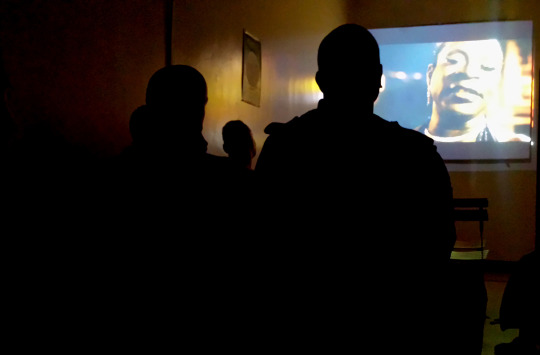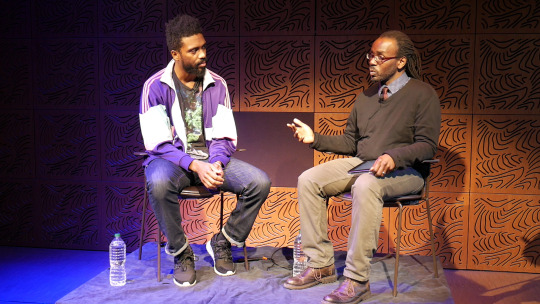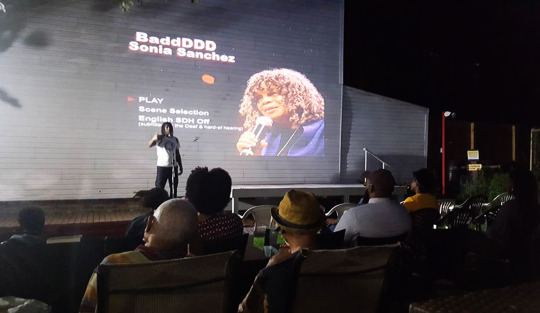Conversations | Curtis Caesar John’s Micro-cinema, The Luminal Theater
“…the key for me was how we always huddled around the TV to watch Black faces, and how seeing people like us on television always gave me a stronger connection to the world."
Visionary, cinephile, and Brooklyn-native, Curtis John founded The Luminal Theater in 2015. The project is an intimate micro-cinema dedicated to preserving the artistry and presence of the Black filmmaking community in Bedford-Stuyvesant, Brooklyn. The demographics of the neighborhood are shifting and Curtis’s theater celebrates an arts community that flourishes with decades of diversity and the African Diaspora experience despite the effects of gentrification. Embracing film’s power to create dialogue, forge empathy, and allow viewers to inhabit new worlds, The Luminal Theater prompts questions like “what is black identity?” and creates a close-knit space for community and stimulating discussion.
The Luminal Theater is a NYFA fiscally sponsored organization with grants awarded from the Brooklyn Arts Council and the Citizens Committee for New York City. From screening horror and drama to film noir, The Luminal Theater exhibits a diverse array of feature and short films created by Black filmmakers throughout the year. Among its enterprises is a partnership with Richard Beavers Gallery for the screening of an ongoing film series entitled Black Is…., and the Black Film Space Autumn Screening Series, which showcases film projects by members of Black Film Space.
Read on to learn more about Curtis’ passion for film and how he harnessed his sense of power and independence to create The Luminal Theater.
Upcoming Screening Events:
Black Film Space Autumn Screening Series
The Luminal Theater is showcasing the latest film projects from members of Black Film Space. Six to eight filmmakers will screen their films at each event, followed by a brief Q & A session.
When: November 16 & November 30, 2017, 7:30 PM – 10:00 PM
Where: Richard Beavers Gallery, 408 Marcus Garvey Boulevard, Brooklyn, NY 11216
Cost: $8
Buy tickets here: November 16 and November 30

NYFA: Not only are you the founder of The Luminal Theater, you are also a filmmaker and producer. How did you become involved with film? What would you say is the greatest power of it?
Curtis John: I got involved with film from a total cineaste worldview very early in life. I was fascinated with the moving image as early as I can remember. Although I watched everything from The Brady Bunch to Roots to Shakespeare on PBS, the key for me was how we always huddled around the TV to watch Black faces, and how seeing people like us on television always gave me a stronger connection to the world. Watching a series like Roots as a youth (the replay, not the original broadcast–I’m not that old!) and then discovering Reading Rainbow when it was first broadcasted, knowing the star LeVar Burton was the same person…that tripped me out, in the best way! I feel it lent me the power on how to share stories in multiple ways. When it came time to pursue a career, filmmaking was a no-brainer.
With that, I’d say the greatest power of film is in learning about how other people live, even if it’s just through that singular filmmaker’s lens, and using that to respect who they are. My parents taught my brothers and me early on in life to look past the obvious nature of things to examine its truth, so I knew that watching one film or reading one newspaper article is not the whole story, but it is a solid step in the right direction towards how these creatives explore the world. So becoming part of that journey is the best way to discover who you are or even chose not to be. And frankly, doing it within a shared audience experience is also crucial. Hearing and seeing people’s immediate reactions can make or break how good a film may be for you, and that experience needs to be embraced as much as possible!
NYFA: Black Is… is an ongoing film series presented in partnership with Richard Beavers Gallery. What genres of films have been shown in this series and how do you decide which ones to include in the programming?
CJ: Black Is… is a multi-genre series of both feature-length and short films showcases. Our first film in this category was the documentary, Little White Lie by Lacey Schwartz, about a young woman lied to for years about her true parentage. Our second film was As an Act of Protest, a narrative film by Dennis Leroy Kangalee on how a fed up Black actor deals with systemic police brutality. We chose the films for this series based on their intricacy in exploring the ways Blackness is regarded in our society versus how these filmmakers ultimately chose to define Blackness in their own work. These films break the monolithic view of Black society showing it to be complex in its definition of who we are and how we move throughout the world. The title, however, is inspired by one of my favorite filmmakers, documentarian Marlon Riggs, and his film Black Is…Black Ain’t, which explored similar themes as our series does.

NYFA: What conversations and ideas have emerged in regards to defining Black identity in post-screening events? If shared, how have participants negotiated their own Black identity in Bedford-Stuyvesant or in the U.S.?
CJ: Our post-screening conversations have been quite dramatic! For Little White Lie, even though filmmaker Lacey Schwartz could not be there, the brunt of the conversation was on white privilege and how the need to maintain that in American society (via Lacey’s family secrets ignoring obvious truths) can potentially destroy those less able to define themselves. The participants thought that those who are able to control the definition of what Blackness is, or even what beauty is, have the power unless it is reclaimed, which is what Schwartz did.
As an Act of Protest addressed how audience members negotiate their own Black identity in Bedford-Stuyvesant and beyond. That film is very multi-layered, with one of the unnamed focuses being early gentrification in Harlem during the late 1990s and early 2000s. That displacement led to one of the lead characters, Cairo, to act desperately in defining himself and in his combatting of racist acts. Bed-Stuy residents are very conscious of gentrification, whether they are "originals” or gentrifiers themselves; having to re-define the place you call home created a long and sensitive conversation with our audiences. Gentrification actually seems to come up at least every other week at our screenings!

NYFA: What observations and/or personal experiences have informed your own understanding of black identity?
CJ: Where do I even begin with this?! For me, it was being born and raised in Brooklyn in a primarily Caribbean community. Being the son of immigrants, I was imbued with a high level of pride and independence that I carry to this day. I feel that’s why even though I still work in film production, the programming aspect of it all is my actual passion. Working on set just doesn’t appeal to me, unless I’m in charge! I say that a bit tongue-in-cheek, but for me, Black identity is always about working towards independence and gaining access to the resources to best make that happen.
NYFA: The Luminal Theater’s mission is to preserve and to provide an outlet for creative Black voices in Bedford-Stuyvesant, particularly in film and multimedia. How has gentrification impacted artists in this neighborhood? Is gentrification bringing in more white artists or more artists in general?
CJ: Gentrification has impacted artists in Bed-Stuy the same way it did in DUMBO, Williamsburg, and other places: by pricing them out of previously affordable neighborhoods. Non-black artists and others who are forced out of Manhattan and North Brooklyn neighborhoods had to find somewhere to call home and naturally moved further south of those aforementioned neighborhoods, to places their mothers and grandfathers abandoned generations ago. Many artists are not able to dedicate their time to purely creating art but have to work other jobs to live in New York City, arguably our country’s most artistically rich, fulfilling, yet extremely expensive city. But artists need time and space in order to actually create, and they are now lacking both. Higher rents are causing our artists, of which we have had in abundance for multiple generations, to seek creative lives in other areas and even in other states! We’re losing many of our best and brightest.
While I have certain opinions on gentrification, I cannot speak fully authoritatively on it. But my hope is that the gentrifying artists that have moved here (some of them who are also Black since gentrification is additionally about class structure) would have enough sensitivity to embrace the rich legacy of this neighborhood and try to understand their neighbors in ways that certain others refuse to.
NYFA: Why did you choose NYFA Fiscal Sponsorship?
CJ: I chose NYFA Fiscal Sponsorship because I needed a recognized organization in which to receive true donations for my non-profit. But what I gained beyond that was steady counseling on how to pursue top-level grants as well as access to people and events that have enhanced my organizational skills tenfold.
Curtis Caesar John is an arts manager, media producer, culture critic, and founder/executive director of The Luminal Theater, a micro-cinema in Bedford-Stuyvesant, Brooklyn, highlighting the work of independent filmmakers of the African diaspora. He is also the co-founder and producer of the ongoing Caribbean Film Series, which takes place at BAMcinématek in Brooklyn, and also serves as a new Programmer-at-Large at BAMcinématek.
– Interview conducted by Priscilla Son, Program Assistant, Fiscal Sponsorship & Finance
Are you an artist or a new organization interested in expanding your fundraising capacity through NYFA Fiscal Sponsorship? We accept applications on a quarterly basis and our next no-fee deadline is December 31. Click here to learn more about the program, current fiscally-sponsored projects, and to apply.
Images: Headshot of Curtis John, Sharp Eye Photos; The Luminal Theater screening for the film We Came to Sweat, Curtis Caesar John, 2015; The Luminal Theater’s Beyond the Cut artist discussion series featuring Shaka King, Marc Ennette, 2016; The Luminal Theater screening of BaddDDD Sonia Sanchez at the second Cinema Garden Party, Curtis Caesar John, 2017





